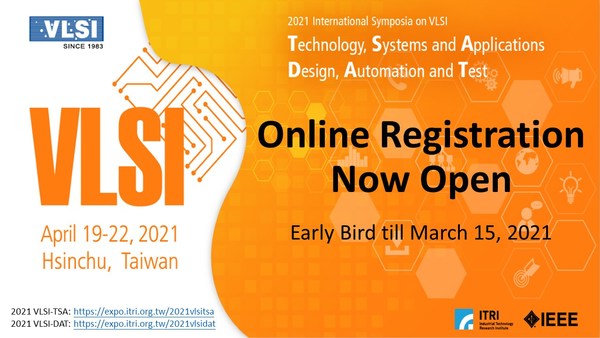Focusing on AI, 5G, Deep Learning, Smart Skins and In-Memory Computing
 |
HSINCHU, , Dec. 29, 2020 — AI, 5G, deep learning, and biomedical electronics are reshaping industries and experiences in the semiconductor industry. To address these key trends, the Industrial Technology Research Institute (ITRI) will host the 2021 International Symposia on VLSI Technology, Systems and Applications (VLSI-TSA) and Design, Automation and Test (VLSI-DAT) on April 19-22, 2021 at the Ambassador Hotel, Hsinchu, Taiwan. Experts from top companies and prestigious academic institutions, including TSMC, IBM, Hitachi, Stanford University, Massachusetts Institute of Technology (MIT), The University of Tokyo, and Olin College of Engineering will share their insights and latest research findings on 5G and AI product innovations, techniques of efficient deep learning, in-memory computing, DTCO and advanced packaging, hardware security, biomedical applications, and low dimensional materials and devices.

The 2021 VLSI-TSA and VLSI-DAT Symposia early bird registration will be available from January 1, 2021 to March 15, 2021.
The VLSI-TSA and VLSI-DAT symposia were first held in 1983, hosting premiere conferences in semiconductor-related fields and attracting up to 1,000 participants every year. VLSI-TSA and VLSI-DAT provide a unique opportunity to network leading experts worldwide and allow participants to explore advanced technologies in the semiconductor industry. In the 2021 event, six esteemed experts will give keynote speeches. Prof. Evan Reed from Stanford University will discuss the success stories of data mining and machine learning for electronic materials selection. Dr. Lipen Yuan from TSMC will explore the technology innovations that will enable continued scaling, including 3D stacking and other advanced packaging trends. Dr. Masanao Yamaoka from Hitachi will introduce the CMOS annealing machine and present how it solves combinatorial optimization problems. Prof. Song Han from MIT will talk about "Putting AI on Diet" and focus on techniques to reduce the computation recourse, human resource, and data resource for deep learning. Prof. Takao Someya from The University of Tokyo will review recent progresses of stretchable thin-film electronics for applications to robotics and wearables and address the future prospect of smart skins. Prof. Richard K. Miller, President Emeritus of Olin College of Engineering, will share his insights into remaking engineering education for the innovation economy.
The 2021 VLSI-TSA and VLSI-DAT symposia will be held in a hybrid format, incorporating an in-person conference and a virtual platform with on-demand presentations. The in-person conference will be held on April 19-22, 2021 at the Ambassador Hotel, Hsinchu, Taiwan. Following the physical event, there will be a virtual conference providing online access to on-demand video presentations from April 23 to May 22, 2021. Over 150 outstanding papers will be presented during the symposia.
Online registration will be open from January 1, 2021. The early bird registration is valid until March 15, 2021, and students are eligible for an up to 80% discount on their registration fee. Registration link: https://reg.itri.org.tw/2021VLSI.
For further information, please visit the conference websites:
2021 VLSI-TSA: https://expo.itri.org.tw/2021vlsitsa
2021 VLSI-DAT: https://expo.itri.org.tw/2021vlsidat
About ITRI
Industrial Technology Research Institute (ITRI) is one of the world’s leading technology R&D institutions aiming to innovate a better future for society. Founded in 1973, ITRI has played a vital role in transforming Taiwan’s industries from labor-intensive into innovation-driven. To address market needs and global trends, it has launched its 2030 Technology Strategy & Roadmap and focuses on innovation development in Smart Living, Quality Health, and Sustainable Environment. It also strives to strengthen Intelligentization Enabling Technology to support diversified applications.
Over the years, ITRI is dedicated to incubating startups and spinoffs, including well-known names such as UMC and TSMC. In addition to its headquarters in Taiwan, ITRI has branch offices in the U.S., Europe, and Japan in an effort to extend its R&D scope and promote international cooperation across the globe. For more information, please visit https://www.itri.org/eng.

